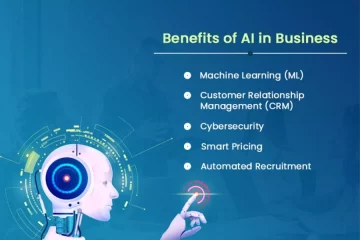The Ethics of AI: Navigating the Complexities of Artificial Intelligence

Artificial Intelligence | mykaba
As technology continues to evolve at an unprecedented rate, artificial intelligence (AI) is becoming increasingly prevalent across various industries. From chatbots and virtual assistants to self-driving cars and advanced medical diagnoses, AI is changing the way we interact with technology. However, with great power comes great responsibility. The ethics of AI have become a hotly debated topic as we navigate the complexities and potential consequences of this rapidly advancing technology. It raises important questions about the role of AI in society, the potential biases it may perpetuate, and the ethical implications of its decision-making processes. As a digital marketer, it’s crucial to stay informed about the latest developments in AI and understand the ethical considerations involved. In this article, we will explore the ethical challenges of AI and the responsibilities that come with its implementation.
The Importance of Ethical AI
AI has the potential to revolutionize the way we live and work, but it also has the potential to cause harm if not developed and implemented ethically. Ethical AI is important because it ensures that the technology is developed and used in a way that is fair, transparent, and accountable. AI systems have the ability to make decisions that affect people’s lives and livelihoods, and it’s essential that these decisions are made with the utmost care and consideration.
In addition, ethical AI promotes public trust in the technology. If people believe that AI is being developed and used ethically, they are more likely to embrace it and benefit from its capabilities. Conversely, if people believe that AI is being developed and used unethically, they may be hesitant to use it or even actively oppose it. This can hinder progress and innovation in the field of AI.
Defining Ethical AI
The definition of ethical AI is still evolving as the technology continues to develop and new ethical dilemmas arise. However, at its core, ethical AI refers to the development and use of AI in a way that is consistent with moral principles and values. This includes principles such as fairness, transparency, accountability, and non-discrimination.
Fairness in AI means that the technology should not perpetuate or reinforce existing biases or discrimination. For example, an AI system used in hiring should not discriminate against candidates based on their gender, race, or other protected characteristics. Transparency in AI means that the decision-making processes of the technology should be clear and understandable. Accountability in AI means that there should be mechanisms in place to hold developers and users of the technology responsible for its actions. Non-discrimination in AI means that the technology should not be used to harm or disadvantage any particular group of people.
The Potential Risks of AI
While AI has the potential to bring about significant positive change, it also poses potential risks and challenges. One of the biggest risks of AI is the perpetuation of bias and discrimination. AI systems are often trained on datasets that may reflect biased or discriminatory views, which can lead to the perpetuation of these biases in the technology’s decision-making processes. This can have real-world consequences, such as perpetuating discrimination in hiring or lending practices.
Another potential risk of AI is the lack of accountability and transparency. AI systems can make decisions that affect people’s lives and livelihoods, but it can be difficult to understand how these decisions are made or who is responsible for them. This can make it challenging to hold developers and users of the technology accountable for its actions.
Finally, there is also the risk of job displacement as AI becomes more prevalent in various industries. While AI has the potential to create new jobs, it may also lead to the automation of certain tasks and the displacement of workers in certain fields. This can have significant economic and social consequences.
The Role of Government and Policy Makers in Ethical AI
Government and policy makers have an important role to play in promoting ethical AI. They can create regulations and guidelines that ensure that AI is developed and used in a way that is consistent with moral principles and values. For example, the European Union’s General Data Protection Regulation (GDPR) includes provisions related to AI and data protection. In addition, policy makers can provide funding for research into ethical AI and support initiatives that promote public awareness and education about the technology.
The Responsibility of AI Developers and Users
Developers and users of AI also have a responsibility to ensure that the technology is developed and used ethically. Developers should prioritize fairness, transparency, accountability, and non-discrimination in the design and development of AI systems. They should also be aware of the potential biases that can arise in AI and take steps to mitigate them.
Users of AI should also be aware of the potential risks and challenges associated with the technology. They should ask questions about how AI systems are developed and how decisions are made, and they should advocate for ethical AI practices in their organizations and communities.
Examples of Ethical AI Use Cases
There are many examples of AI being used in an ethical way. One example is the use of AI in medical diagnosis. AI can be used to analyze medical images and identify potential health issues, which can lead to earlier detection and treatment of diseases. Another example is the use of AI in disaster response. AI can be used to analyze satellite imagery and identify areas that need immediate assistance, which can help emergency responders prioritize their efforts.
The Future of AI Ethics
The field of AI ethics is still evolving, and it’s likely that new ethical dilemmas will arise as the technology continues to develop. However, it’s clear that ethical considerations will play an increasingly important role in the development and use of AI. As AI becomes more prevalent in various industries, it’s essential that we continue to prioritize fairness, transparency, accountability, and non-discrimination in the design and use of the technology.
Resources for Learning More About Ethical AI
There are many resources available for those who want to learn more about ethical AI. Some useful resources include:
- The IEEE Global Initiative on Ethics of Autonomous and Intelligent Systems
- The Partnership on AI
- The AI Now Institute
- The Center for Humane Technology
Conclusion
AI has the potential to bring about significant positive change, but it also poses potential risks and challenges. Ethical considerations are essential to ensure that AI is developed and used in a way that is consistent with moral principles and values. As digital marketers, it’s crucial that we stay informed about the latest developments in AI and understand the ethical considerations involved. By prioritizing fairness, transparency, accountability, and non-discrimination in the design and use of AI, we can help ensure that the technology benefits society as a whole.









